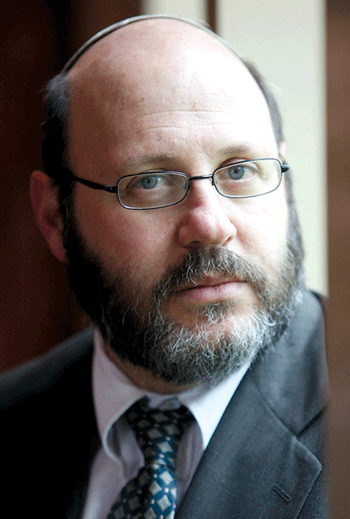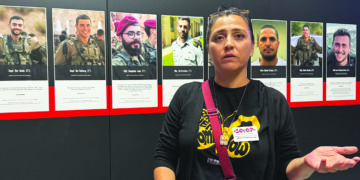Leaders from 15 local religious organizations will eat on the average weekly food-stamp allowance to raise awareness of hunger and poverty
By ERIN ELLIOTT BRYAN / Community News Editor
“Blessed are You, Lord, our God, King of the Universe who brings forth bread from the earth.”
— Hamotzi (The Blessing Over the Bread)
According to the U.S. Census Bureau, 15.1 percent of Americans live below the poverty line and 16.2 million children struggle with hunger. In an effort to raise awareness of this reality, religious leaders around the country, including in the Twin Cities, will participate in programs that take aim at hunger in America.
From Nov. 11-17, members of 15 area religious organizations will undertake the challenge to eat on $31.50 per week, the average per-person food allotment given to recipients of SNAP (the federal Supplemental Nutrition Assistance Program).
Known as the Food Stamp Challenge, the program will provide a glimpse into life on a food-stamp budget. Community-wide programs will take place on Nov. 10, 11 and 18 at various locations to offer opportunities for people to get involved in long-term advocacy efforts.
The program is part of “United Against Hunger: An Interfaith Partnership,” which is sponsored by the Jay Phillips Center for Interfaith Learning, and includes leaders from Jewish, Christian and Islamic organizations in Minnesota. In the Jewish community, the programs are co-sponsored by Adath Jeshurun Congregation, Beth El Synagogue, Beth Jacob Congregation, the Jewish Community Relations Council of Minnesota and the Dakotas (JCRC), Jewish Community Action and the Minnesota Rabbinical Association.
The programs are taking place in conjunction with national hunger awareness initiatives, including the Food Stamp Challenge sponsored by the Jewish Council for Public Affairs (JCPA) and the recent Global Hunger Shabbat, sponsored by American Jewish World Service (AJWS), which took place Nov. 2 and 3.

Rabbi Morris Allen: It’s a pretty stark kind of budget. And families are making these decisions all the time.
“There has been a much more concerted effort, nationally, to get clergy involved in this, and both the Rabbinical Assembly and United Synagogues for Conservative Judaism have been much more involved,” said Rabbi Morris Allen, of Beth Jacob Congregation, who also heads Magen Tzedek, a certification initiative for kosher food that meets both Jewish halachic (legal) and ethical standards for workers, consumers, animals and the environment. “We’re making a statement. This is what rabbis do, they teach. And we want to be able to teach people about the realities of hunger.”
Beth Jacob is encouraging its congregants to join the challenge or donate to the cause. There is a blog online at: www.beth-jacob.org and there is a hunger awareness display set up in the shul’s lobby, which showcases what can (and cannot) be purchased for $31.50.
“All the products are kosher, it’s rice, it’s beans, a half dozen eggs, some canned vegetables, some canned fruit — no fresh produce, no fresh fruit — a jar of peanut butter, some hechshered tortillas that you could turn into wraps, I guess, a box of cereal, a box of soy milk,” Allen said. “It’s a pretty stark kind of budget. And families are making these decisions all the time.”
The synagogue will also host a teaching event following Shabbat morning services, at 1 p.m., on Saturday, Nov. 10. The rabbis will share their theological reflections and understanding of what Judaism says about food and hunger; the community is invited.
“For all the things that we have to deal with, for all the challenges that we have in our lives, Judaism really teaches this as a first and foremost, profound lesson,” said Rabbi Lynn Liberman, Beth Jacob’s director of congregational learning. “In the teachings of putting together a community, when a new Jewish community is forming, one of the very first institutions, before the synagogue, is the soup kitchen. And it’s an outstanding reality that we are always going to have among us those we have to help. And food is a basic need that should not be denied to anybody.”
Rabbi Sharon Stiefel, of Mayim Rabim Congregation, and a member of Beth Jacob, wrote an article about the challenge for Mayim Rabim’s most recent newsletter. She talked about being approached to participate in the program right before Yom Kippur, and the decision to participate with her family.
“Knowing that every day people with food insecurity do not get to end their fast like I did after Neilah, I immediately signed up,” Stiefel wrote. “Frankly, I have never done anything like this before. I imagine that daily I will be confronted with situations where I will be challenged to live within my budget. As a family, we plan to donate the money we save in groceries to the Jewish Council for Public Affairs (JCPA) Confronting Hunger Campaign.”
On Sunday, Nov. 11, participating religious leaders will meet at Holy Trinity Lutheran Church, 2730 E. 31st St., Minneapolis. From 2 to 4 p.m., they will shop at a nearby Cub Foods to buy $31.50 worth of groceries for the week.
Following the shopping trip, participants will return to the church to discuss the Food Stamp Challenge, as well as Jewish, Muslim and Christian teachings on caring for the poor. For the next week, some of the participants will pledge to only eat what was purchased with their $31.50.
“I need to understand firsthand what individuals experience when they live off food stamps, so I can raise awareness with a stronger focus,” said Rabbi Adam J. Titcher, assistant rabbi at Adath Jeshurun. “There are many impoverished individuals and families in my greater community and, as a religious leader, I am a partner to help guide my community to end hunger where it is found and help those who desperately need [food].”
Rabbi Aaron S. Weininger, Adath Jeshurun assistant rabbi and the Berman Family Chair in Jewish Learning, added, “The Food Stamp Challenge is a sacred call to action that gives visibility to an important issue and allows us to be engaged partners in repairing God’s world.”
Following the weeklong challenge, program participants will gather on Sunday, Nov. 18. From 10 a.m. to 12:30 p.m., they will prepare and serve food at the Family Place, 244 E. 10th St., St. Paul. Following their service, at 12:30 p.m., those who pledged to eat only food purchased with their food-stamp budget will talk about their experience at First Baptist Church, 499 N. Wacouta St., St. Paul. There will also be experts talking about how to combat hunger in Minnesota.
Among the hunger organizations with which people can be involved are MN FoodShare (part of the Greater Minneapolis Council of Churches), a co-sponsor of the interfaith programs; Community Action Partnership of Suburban Hennepin; Hunger Solutions MN; and Minnesota Partners to End Hunger, a statewide network of service providers and advocates.
In the local Jewish community, Rabbi Harold Kravitz, senior rabbi of Adath Jeshurun and its Max Newman family chair in rabbinics, serves as national board chair of MAZON: A Jewish Response to Hunger.
“By participating in this challenge we hope to raise awareness and engage people in advocacy efforts to prevent crippling cuts in the budget of federal SNAP,” Kravitz said. “We also invite people to join us in working on MAZON’s Minnesota Advocacy Initiative to address gaps in statewide school lunch programs. Hungry kids do not learn well.”
Rabbi Amy Eilberg, who works with the Jay Phillips Center and is a member of Beth Jacob Congregation, said she is excited that this program will bring together leaders from several different faith communities.
“The problem of hunger is right here at home in our own community,” she said. “Really no faithful or thoughtful person should be able to go to bed at night without thinking about what was their part to do. These programs engage people, both in symbolic action and in raising awareness and knowledge, and an invitation to long-term action to combat hunger.”
She added that her interpretation of Judaism’s Blessing Over the Bread implies that there is enough for everyone to eat.
“I think I understand that to be as a fact that there is enough food in the world for everyone, but that we have to be God’s hands in that… In order for God’s intention that everyone be nourished to come to fruition, we need to be the hands and the will for those basic needs to be accomplished,” Eilberg said. “Our tradition speaks in so many ways about acts of justice. There is hardly a greater injustice than a parent watching a child go hungry.”
***
For information on the Food Stamp Challenge and hunger issues, visit: www.beth-jacob.org, www.adathjeshurun.org, www.stthomas.edu/jpc or: www.mazon.org.
(American Jewish World, 11.9.12)



















